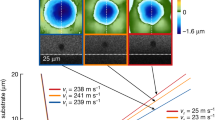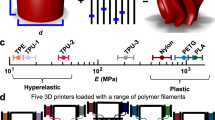Abstract
This excellent summary begins with a general account of the Raman effect, in which its relationship to other similar effects is carefully considered. The theory is treated first classically, when it is shown that, in addition to the Tyndall and Raman effects, scatterings of higher order are to be expected, and the point is stressed that asymmetrical forces are required for the Raman effect to appear. The theory is then given in terms of wave mechanics, and correspondences between the two methods of treatment are pointed out. The experimental technique, the polarisation of the lines, their intensities, and the effect of temperature variation on them, are only briefly described.
Der Ramaneffekt.
Prof. Dr. Clemens Schaefer Dr. Frank Matossi. (Fortschritte der Chemie, Physik und physikalischen Chemie, herausgegeben von Prof. Dr. A. Eucken, Band 20, Heft 6.) Pp. iii + 52. (Berlin: Gebriider Borntraeger, 1930.) 8 gold marks.
This is a preview of subscription content, access via your institution
Access options
Subscribe to this journal
Receive 51 print issues and online access
$199.00 per year
only $3.90 per issue
Buy this article
- Purchase on Springer Link
- Instant access to full article PDF
Prices may be subject to local taxes which are calculated during checkout
Similar content being viewed by others
Rights and permissions
About this article
Cite this article
Menzies., A. Our Bookshelf. Nature 126, 535–536 (1930). https://doi.org/10.1038/126535c0
Issue Date:
DOI: https://doi.org/10.1038/126535c0
Comments
By submitting a comment you agree to abide by our Terms and Community Guidelines. If you find something abusive or that does not comply with our terms or guidelines please flag it as inappropriate.



